
Cape Cod Dog Bite Attorneys – Local Injury Attorney for Victims
Compassionate Cape Cod Dog Bite Legal Support When You Need It Most
A dog bite is a sudden, terrifying event that can leave both physical and emotional scars. Beyond the immediate pain of the injury, victims often face a challenging recovery, medical bills, and lasting trauma. At Snow Law Firm, we understand the profound impact a dog attack can have on your life. We are here to provide compassionate support and expert legal representation for bite victims on Cape Cod, the South Shore, and South Coast MA, helping you hold the owner accountable and secure the resources you need to heal.
How Snow Law Firm Can Help
After a dog bite, you may be facing resistance from an insurance company or the dog’s owner. They may try to downplay your injuries or shift blame. You need an advocate who will fight for your rights. In Massachusetts, dog owners are held to a “strict liability” standard, meaning they are responsible for the harm their dog causes.
The team at Snow Law Firm will handle all aspects of your claim. We investigate the incident, document your injuries, and build a compelling case to ensure you are fully compensated for your damages, including:
Medical expenses, including emergency care and plastic surgery
Lost wages from time missed at work
Pain and suffering
Emotional distress and psychological counseling
Scarring and disfigurement
We manage the complex legal and insurance negotiations so you can focus on your recovery with peace of mind.
Proven Results for Injury Victims
Our firm is dedicated to securing justice for those who have been wrongfully injured in dog attacks. Here are examples of real results we’ve obtained for our clients:
$500,000 Settlement: Woman suffers permanent partial disability from a dog knock-down.
$300,000 Settlement: Woman injured when a dog charged her while she was walking her own dog, resulting a serious hip fracture that required surgery.
$175,000 Settlement: Woman mauled by a vicious 135 lb. dog.
What to Do After a Dog Bite
The steps you take immediately after a dog bite are crucial for your health and your legal claim.
Seek Medical Attention: Your health is the top priority. Dog bites carry a high risk of infection and can be more serious than they appear. Go to an emergency room or urgent care clinic right away.
Identify the Dog and Owner: If possible, get the name and contact information of the dog's owner. Note the dog's appearance.
Report the Bite: Contact your local animal control or police department to file an official report. This creates important documentation for your case.
Document Everything: Take photos of your injuries as soon as possible. Write down the details of the attack, including the date, time, and location.
Do Not Speak to Insurers: Avoid giving any statements to the dog owner’s insurance company before you have consulted with an attorney.
Contact an Attorney: An experienced dog bite Attorney can advise you on your rights and help you navigate the claims process.
Understanding Massachusetts Dog Bite Law
Massachusetts General Laws Chapter 140, Section 155 holds dog owners strictly liable for any damages their dog causes. This means that, unlike in some other states, a bite victim does not need to prove that the owner knew the dog was dangerous. If a dog bites someone, the owner is legally responsible.
The only exceptions are if the victim was trespassing, teasing, tormenting, or abusing the dog. However, this defense is not applicable if the victim is a child under the age of seven. Our firm has a deep understanding of this law and how to apply it effectively to protect our clients.
Frequently Asked Questions About Dog Bites
-
It is highly recommended. An experienced attorney can ensure you are not taken advantage of by an insurance company and can help you recover full compensation for all your damages, including pain, suffering, and potential scarring, which are often undervalued by insurers.
-
This is a common and understandable concern. It’s important to remember that your claim is made against the owner's homeowners or renters insurance policy, not their personal assets. These policies exist specifically to cover this type of incident. We can handle the claim professionally to help preserve your relationship.
-
The value of a claim depends on several factors, including the severity of the bite, the cost of medical treatment, the extent of any scarring or disfigurement, and the impact on your life. We can evaluate the specifics of your case during a free consultation.
-
In Massachusetts, it doesn't matter. The "one-bite rule" does not apply here. Due to the state's strict liability statute, the owner is responsible for the damages their dog causes, regardless of the dog's history.
Begin Your Path to Healing and Justice
You should not have to bear the financial and emotional burden of a dog attack alone. Snow Law Firm is here to provide the support and legal strength you need to move forward. Let our family help yours. Contact us today for a free, confidential consultation to learn how we can assist you.
NO FEE
Unless We Successfully Resolve Your Case
Snow Law Firm takes personal injury cases on a contingency-fee basis. This means you will not have to pay any upfront costs and will not be charged for out-of-pocket expenses until your case is resolved and Snow Law Firm has successfully secured a settlement, award or jury verdict on your behalf.

Snow Law Firm accepts a variety of claims for personal & commercial motor vehicle accidents including:
Rear-end pileups, rollover accidents and head-on collisions
Intersection crashes and failure to yield collisions
Distracted driver accidents and texting accidents
Drunk driving crashes
Teen accidents
Pedestrian accidents
Hit and run accidents
Uninsured collisions and underinsured crashes
Wrongful death
Snow Law Firm represents a variety of motor vehicle accident claims that cause:
Whiplash, neck sprains and strains
Broken bones
Torn rotator cuffs and shoulder injuries
Punctured lungs and injuries to other internal organs
Compression fractures, herniated discs
Fractures of the pelvis
Skull fractures, concussions and post-concussion syndrome
Traumatic brain injuries
Angulated discs causing spinal cord impingement and paralysis
Injuries which cause partial and/or permanent disability
What Our Clients Are Saying

